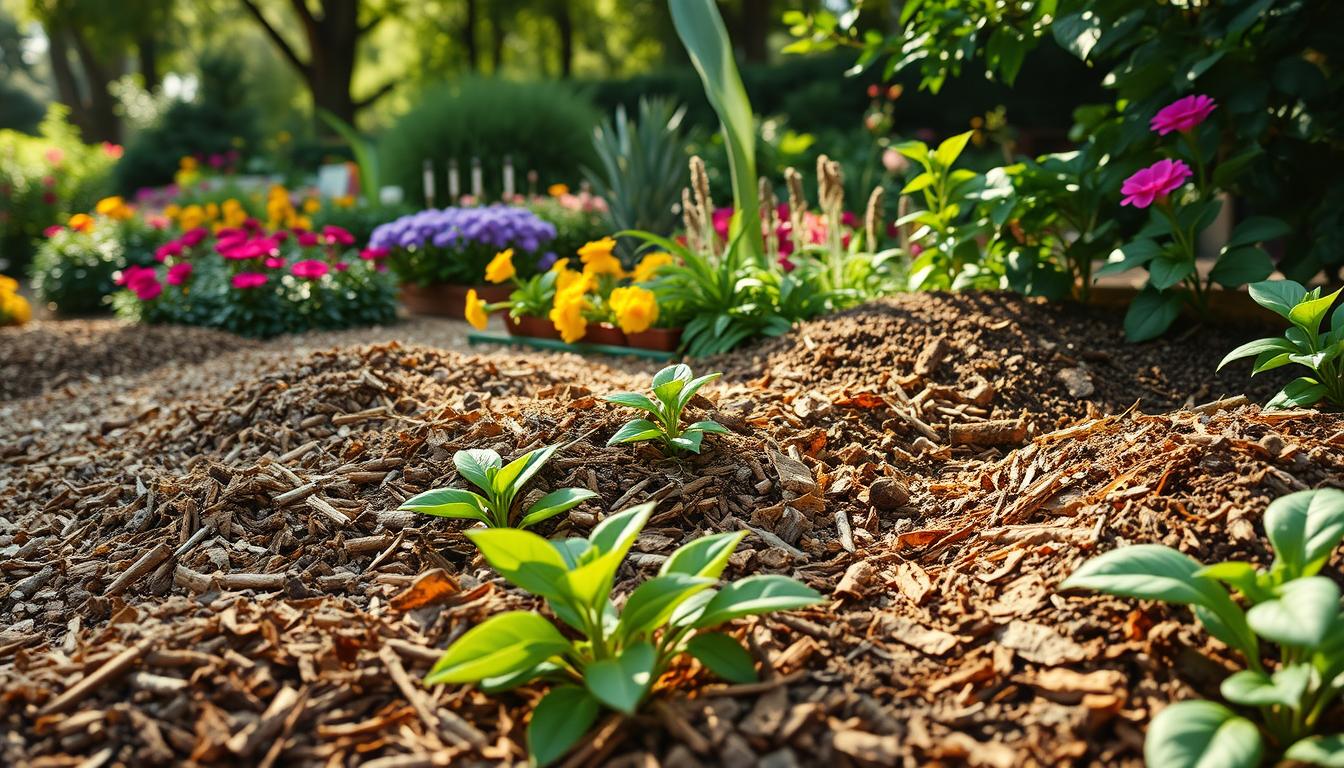I’m excited to share my journey to finding the best mulch for gardens. As a gardener, I know how crucial it is to pick the right mulch. It keeps my plants healthy and thriving. With many options, choosing the best can be tough.
I’m looking for a mulch that retains moisture, suppresses weeds, and controls soil temperature. I’m considering both organic and inorganic mulches.
Using the right mulch makes a big difference. I want one that’s easy to apply and maintain. Organic mulch, made from natural materials like wood chips and leaves, is a top choice. I’m also exploring layering and mixing different mulches to meet my garden’s needs.
I’m diving into the world of mulching, learning about organic and inorganic mulches. I want to know their benefits and drawbacks. By picking the right mulch and techniques, I’m sure I can make my garden lush and thriving.
Why Mulch is Essential for My Garden
Mulch is key to a healthy garden. It keeps the soil from washing away, which is bad for my garden. The right mulch helps prevent soil from getting too hard and supports my plants’ growth.
Choosing the right mulch depends on my plants, the weather, and how it looks. Suppliers offer many types, like wood chips and straw. These are good for the earth and work well.
Protecting the Soil
Mulch keeps the soil safe from extreme temperatures and prevents it from washing away. It also stops moisture from escaping. This makes a stable place for my plants to grow.
Retaining Moisture
Mulch keeps the soil moist, so I don’t have to water as often. This is great for those of us who want to save water.
Weeds: My Worst Enemy
Mulch also fights weeds, which are a big problem in my garden. It blocks light and stops weed seeds from growing. This lets my plants grow without competition.
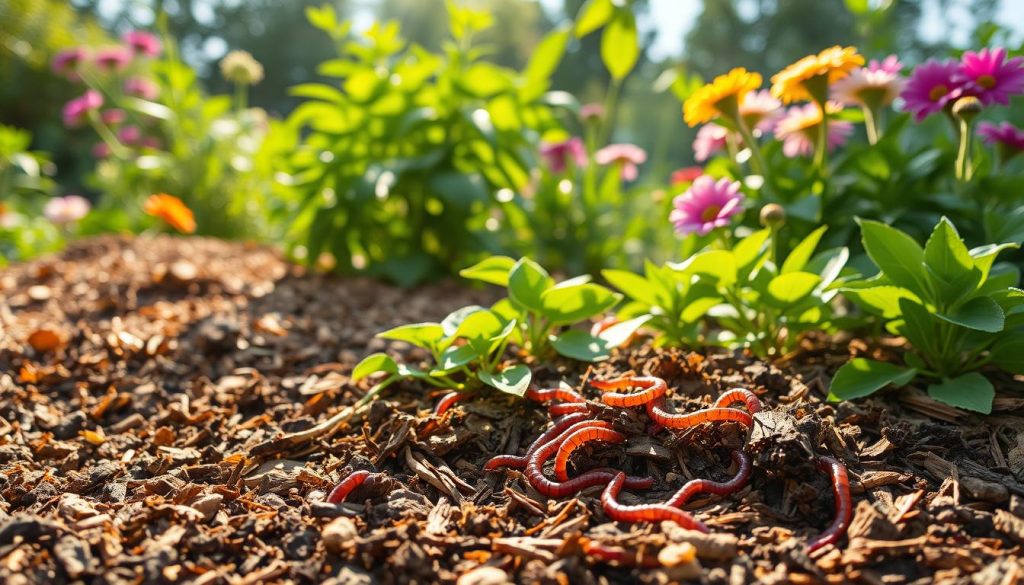
With the right mulch, my garden can be beautiful and low-maintenance. Suppliers have many options, organic and inorganic. By picking the right mulch, I can make my garden lush and vibrant all year.
Types of Mulch I Consider for My Garden
Choosing the right mulch for my garden is important. I think about the plants, climate, and soil type. I prefer organic mulches that are good for the environment. Wood chips, straw, and grass clippings are some of my favorites.
Mulching helps in many ways. It keeps the soil moist, stops weeds, and controls temperature. The right mulch makes my garden healthy and vibrant.
Organic Mulches
Organic mulches come from natural sources and break down easily. They include:
- Wood chips
- Straw
- Grass clippings
- Leaf mold
Inorganic Mulches
Inorganic mulches are made from man-made materials and don’t break down. They include:
- Plastic sheets
- Rubber mulch
- Geotextiles
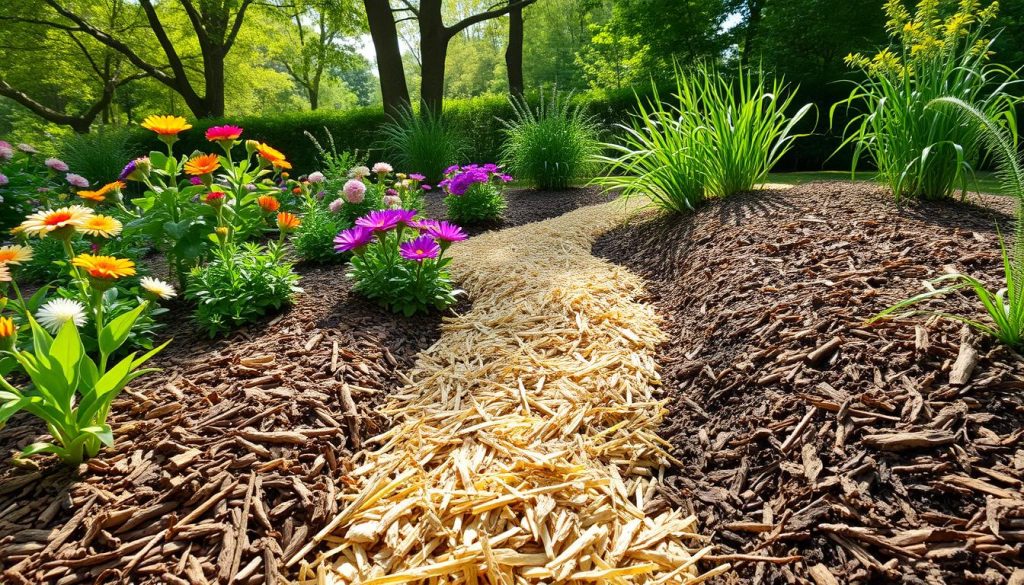
Natural vs. Processed Mulches
Natural mulches come from raw materials, while processed ones are made from recycled stuff. Each has its own pros and cons. My choice depends on what my garden needs and what I like.
| Mulch Type | Advantages | Disadvantages |
|---|---|---|
| Organic Mulch | Biodegradable, sustainable, improves soil health | May attract pests, can be expensive |
| Inorganic Mulch | Durable, low maintenance, weed suppression | Not biodegradable, may harm soil health |
The Best Organic Mulches for My Plants
I’m excited to share my findings on the top-rated garden mulches. Options like wood chips, straw, and grass clippings each have their own benefits and drawbacks. When picking the best mulch for my garden, I think about the plants, soil, and climate.
Wood Chips: A Versatile Option
Wood chips are a favorite among gardeners. They’re easy to find, affordable, and can be delivered right to your doorstep. With mulch delivery services, you can get just the right amount without the hassle.
Straw: Lightweight and Effective
Straw is a great choice for my garden. It’s lightweight, making it easy to spread, and helps keep soil moist. You can find straw at local suppliers or online, and have it delivered.
Grass Clippings: Nutrient-Rich and Convenient
Grass clippings are a convenient and nutrient-rich option. They’re free, and you can collect them from your lawn. Using grass clippings as mulch reduces waste and is perfect for your plants.
When choosing the best organic mulch, consider these factors:
- Plant species: Different plants have unique needs, and some may require specific types of mulch.
- Soil type: The type of soil in your garden affects the type of mulch you choose.
- Climate: The climate in your area plays a significant role in determining the best organic mulch for your garden.
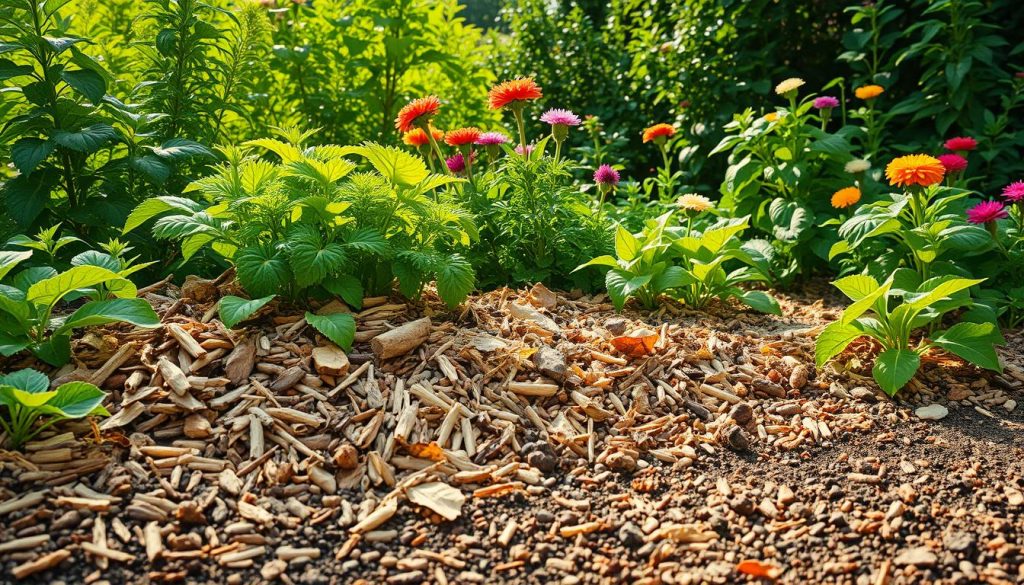
How to Choose the Right Mulch for My Garden
Choosing the right mulch for my garden involves several key factors. First, I consider what my plants need. Different plants do better in different environments. For example, some plants like acidic soil, while others prefer alkaline.
Next, I think about my local climate. The right mulch can depend on where I live. In rainy areas, I need a mulch that lets water drain well. Local mulch delivery services can help pick the best mulch for my climate.
Assessing Plant Needs
To find the best mulch for my plants, I look at soil type, climate, and plant species. This helps me pick a mulch that will help my plants grow well.
Considering Local Climate
My local climate is important for choosing mulch. I consider temperature, rain, and sunlight. This way, I can pick a mulch that keeps soil temperature right, holds moisture, and stops weeds.
Evaluating Aesthetic Preferences
Lastly, I think about how I want my garden to look. There are many mulch types to choose from. I pick one that looks good and meets my plants’ needs.
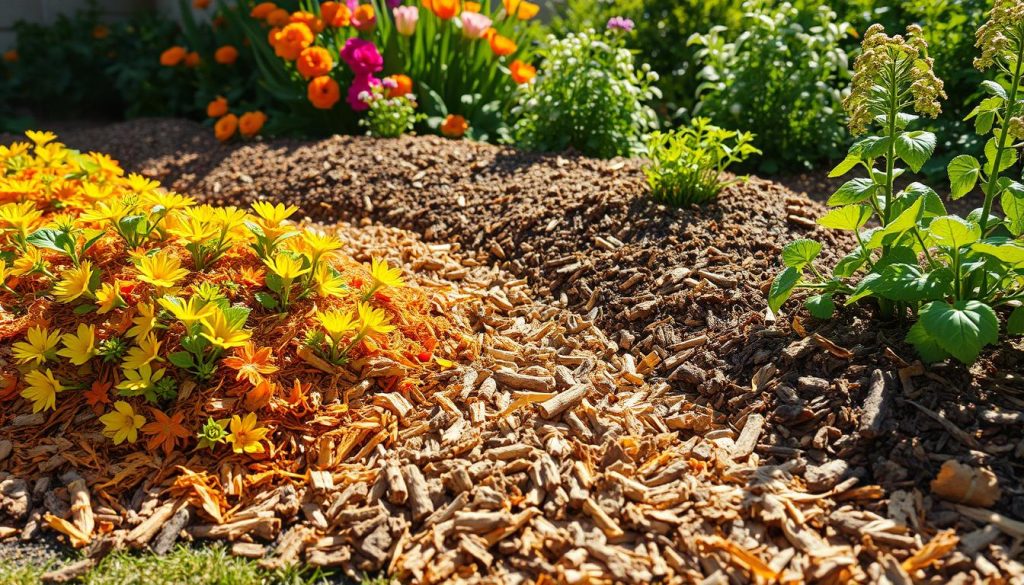
The Role of Color in Garden Mulch
Choosing the right garden mulch is important, and color is a big part of it. The color of the mulch can make your garden look better. It can also match the colors of your plants and flowers, making everything look good together.
There are many types of garden mulch, including natural ones like wood chips, straw, and grass clippings. These mulches help keep the soil moist, stop weeds, and keep the soil temperature right. When picking a mulch color, think about the colors of your plants and flowers. This will help you choose a color that looks good with everything.
- Choose a color that complements the colors of your plants and flowers
- Consider the color of your foliage and how it will change with the seasons
- Think about the overall aesthetic you want to achieve in your garden
By picking the right mulch color, you can make your garden more beautiful. There are many types of mulch out there. You can find the perfect one for your garden’s look and needs.
Pros and Cons of Using Rubber Mulch
When picking the best mulch for my garden, I’ve looked at rubber mulch’s pros and cons. It’s durable and lasts long, making it a favorite among gardeners.
There are important things to think about with rubber mulch. Here are a few key points to keep in mind:
- Durability: Rubber mulch can handle tough weather and lasts for many years.
- Environmental impact: Rubber mulch can harm the environment if not disposed of right.
- Cost: It might cost more than other mulches, but its long life can save money in the long run.
Choosing a good mulch supplier is key. By understanding the good and bad of rubber mulch, gardeners can decide if it’s right for their garden.
Durability and Longevity
Rubber mulch is popular because it can stand up to harsh weather and lasts for years. It’s great for those who want a mulch that’s easy to care for.
Environmental Impact
Rubber mulch can be made from recycled materials, but its environmental impact is important. Gardeners should pick a supplier that offers eco-friendly options and properly disposes of it.
Cost Considerations
Rubber mulch might be pricier than other mulches, but its long life can save money over time. Gardeners should think about the costs and benefits before deciding.
How to Apply Mulch Effectively in My Garden
To make the most of my mulch, I must apply it right. First, I need to prepare the soil. This means checking its type, pH, and nutrients. Knowing my soil’s needs helps me pick the best mulching methods and might even lead me to use mulch delivery services.
Applying the right amount of mulch is also key. The thickness depends on the mulch type, plant species, and climate. Usually, 2-3 inches of organic mulch is ideal. Keeping this layer consistent helps control weeds and keeps the soil moist.
For long-lasting results, I must keep up with maintenance. This includes watering, fertilizing, and pruning plants. By doing these tasks and using professional mulch delivery services, my garden will flourish with less effort over time.
When to Refresh Mulch in My Garden
To keep my garden healthy, I need to know when to refresh the mulch. Mulch helps keep the soil moist, stops weeds, and controls soil temperature. Over time, it can break down or lose its effectiveness. That’s when mulch delivery services are a big help, providing fresh, organic mulch.
Signs like decomposition, compaction, and weed growth mean it’s time for new mulch. The season also plays a part, with more frequent replenishment needed in summer. Regular maintenance keeps my garden thriving, improving soil health and saving water.
Signs That It’s Time to Replace
- Decomposition: When the mulch breaks down, it’s time to replace it.
- Compaction: If the mulch becomes too dense, it can prevent water and air from reaching the roots.
- Weed growth: If weeds start to grow through the mulch, it’s a sign that the mulch is no longer effective.
Seasonal Considerations
Seasonal changes affect the mulch. In spring, I add fresh organic mulch to get my garden ready for growth.
Scheduling Regular Maintenance
Regular maintenance is key to a healthy garden. By replenishing mulch, I enjoy better soil health, save water, and have a vibrant garden. Mulch delivery services help me keep my garden looking great all year.
| Season | Mulch Maintenance |
|---|---|
| Spring | Add fresh organic mulch to garden beds |
| Summer | Replenish mulch as needed, considering decomposition and compaction |
| Fall | Remove dead plant material and add a new layer of mulch |
| Winter | Check mulch levels and replenish as needed to protect plants from extreme temperatures |
The Environmental Impact of Mulching
Mulching has a big impact on the environment. It helps save water and supports local wildlife. Choosing organic mulch from local suppliers is key to sustainability.
Sustainability of Organic Options
Organic mulches like wood chips and straw are good for the planet. They come from local sources, cutting down on carbon emissions. Plus, they use materials that would otherwise be thrown away.
Reducing Water Usage
Mulching keeps soil moist, saving water. It cuts down on evaporation. This means plants need less water, which is good for them and the planet.
Some of the key mulch benefits include:
- Reduced water usage
- Increased soil health
- Support for local wildlife
Supporting Wildlife
Choosing natural mulches and supporting local suppliers helps wildlife. It makes our gardens more beautiful and diverse. This benefits the environment and adds to our gardens’ charm.
DIY Mulch Ideas for Budget-Conscious Gardeners
As someone who loves gardening but is careful with money, I always look for ways to save. Using DIY mulch ideas is a great way to do this. It helps my garden stay healthy and beautiful without costing a lot.
Upcycling Yard Waste
One easy DIY mulch idea is to use yard waste. This includes leaves, branches, and grass clippings. By turning these into mulch, I make my garden better and save money.
Making My Own Compost
Creating my own compost is another smart move. I mix food scraps, yard waste, and other organic stuff. This makes a rich compost that helps my soil and saves me from buying mulch.
Sources for Free Mulch
If making my own mulch isn’t possible, there are other ways to get it. Some community gardens and nurseries give away free mulch. Online, I can find places that offer free mulch too. By looking for these options, I can make my garden beautiful without spending a lot.
- Collect yard waste and process it into mulch
- Make your own compost using food scraps and organic materials
- Explore sources for free mulch in your community
Conclusion: My Journey to the Perfect Garden Mulch
Reflecting on my search for the perfect garden mulch, I feel a great sense of achievement. I’ve found the best mulch for my gardens. It looks great and protects and feeds my plants well.
I’m looking forward to planning more gardens, using what I’ve learned. I know now to think about soil type, plant types, and local weather when picking mulch. This way, my gardens will keep growing and looking good for years.
Sharing my gardening journey with others has become something I love to do. I’ve found many mulch suppliers in my area with lots of choices. I want to help others find the right mulch for their gardens. Together, we can make beautiful, green spaces that make us happy and help our planet.

